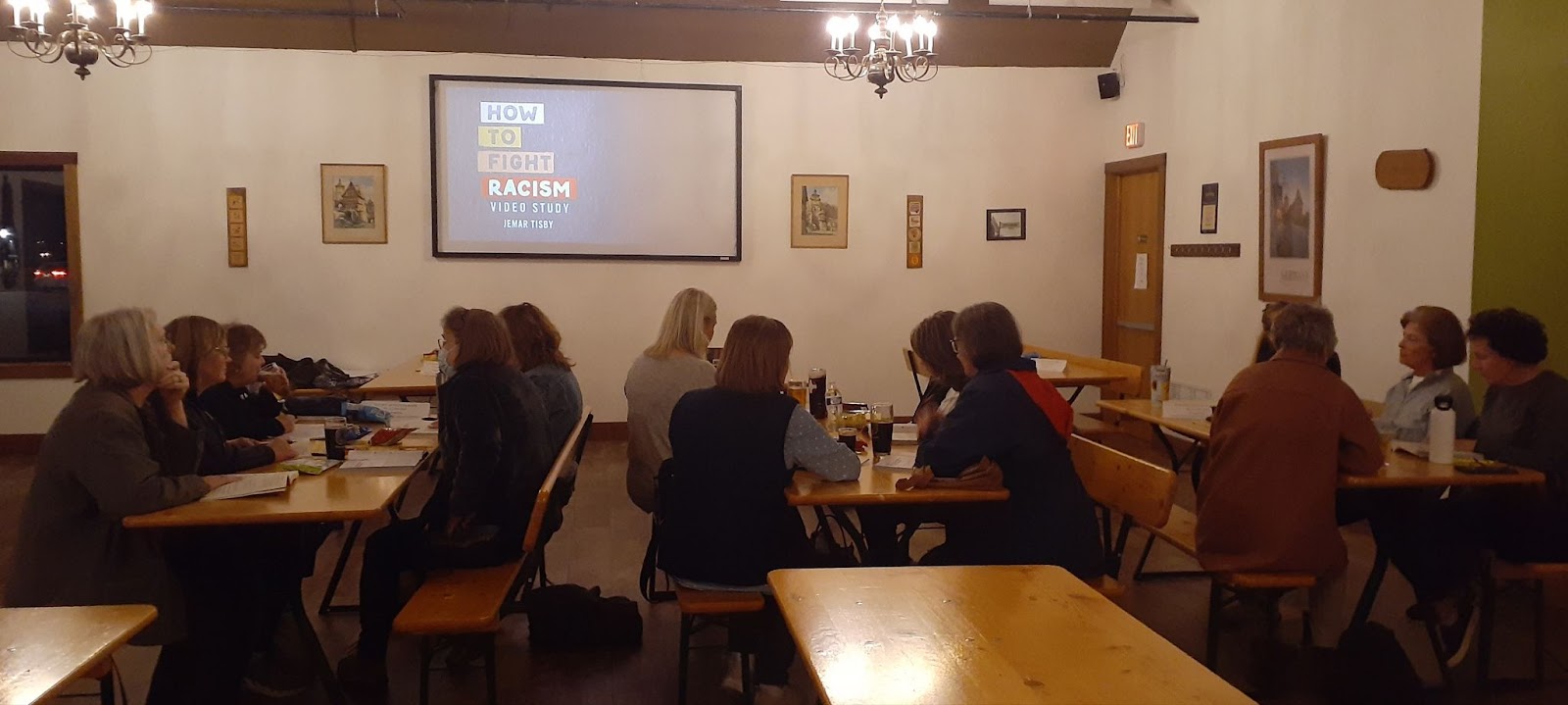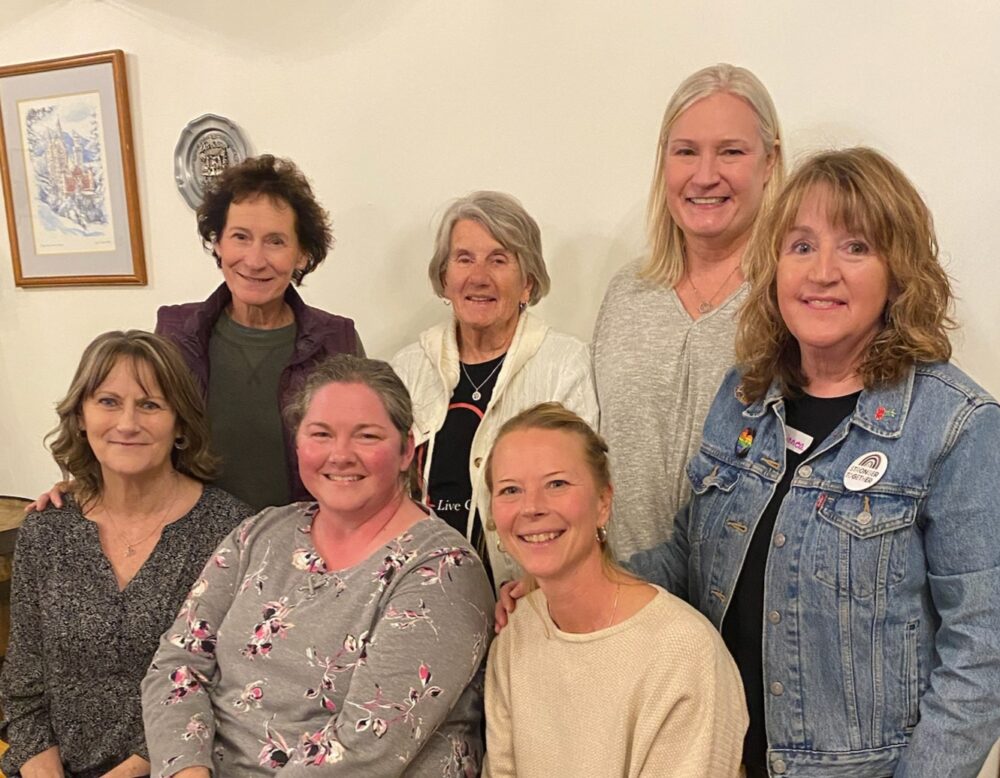Do the best you can until you know better. Then when you know better, do better. – Maya Angelou
Minneapolis – May 2020. Los Angeles – April 1992. USA – April 1968. Tulsa – May/June 1921. The hyperlinks give a clue to what these locations and dates have in common. Despite being separated by generations, these events resulted in racial justice boiling points. Sadly, racial injustices have been happening in the United States for centuries to communities of color. For almost four years, a dedicated group from Holy Trinity Lutheran Church has been focused on doing better.
In the spring of 2020, Pastor Alicia Hilding mentioned the Minneapolis Area Synod’s (MAS) desire to have every congregation prioritize anti-racism work. She gathered a team of people to start a racial justice task force. Members include (bottom row left to right) Jane Wick, Melissa Horejsi, Jen Sayler (top row left to right), Sande Schoenecker, Liz Nelson, Wendy Mathiowetz, and Linnea Hautman. The aftermath of George Floyd’s murder and the Minneapolis riots were the tipping point for many, including Melissa, who felt called to facilitate the group. She explains, “I wanted to do more. I felt called to step up and lead a racial justice group. I knew it was something I could be a part of. I wanted to learn more and to do so alongside a group of people in our church who also wanted to grow in their faith and understand privilege and racism in America.” The newly formed Racial Justice Committee held its first meeting in June 2020 with the assistance of Brenda Blackhawk, the MAS Congregational Organizer for Racial Justice.
As the whitest Christian denomination in the US, battling 400 years of systemic racism is a monumental task. Many Lutherans grew up believing Jesus had blue eyes, blond hair, and light skin…just like the picture hanging on living room walls. Holy Trinity’s Racial Justice Committee’s (RJC) first task was to educate themselves and provide opportunities for others to learn.  Member Sande Schoenecker states, “During the last four years, the committee has dedicated learning about racism and how to be anti-racist. The book study, “How to Fight Racism,” by Jemar Tisby, that we completed this fall was open to the community. It was a very meaningful and purposeful learning experience. We found that many of us share the desire to unlearn racism.”
Member Sande Schoenecker states, “During the last four years, the committee has dedicated learning about racism and how to be anti-racist. The book study, “How to Fight Racism,” by Jemar Tisby, that we completed this fall was open to the community. It was a very meaningful and purposeful learning experience. We found that many of us share the desire to unlearn racism.”
Jen Sayler agrees, “The book study was a definite highlight for me. In his book, Jemar introduced the ARC model – Awareness, Relationships, and Commitment to fighting racism. RJC provides opportunities for awareness, learning, and growth, as well as forming relationships with others in conversation and partnership to stay committed to equity work.”
Jane Wick joined the RJC shortly after becoming a member at Holy Trinity. “I joined because I want to be part of a Christian group that helps our congregation and community realize all of the racial injustices that have happened and are still happening in our world. I have enjoyed being part of events that teach others how to be more open and loving to all people.” Linnea Hautman adds, “I wanted to learn more and grow through the work on anti-racism with other ELCA Lutherans.”
Over the years, the RJC has encouraged cultural exploration through field trips to Hocokata Ti, the Dakota 38 Memorial and Mahkato Wacipi, as well as theater productions of Imagine a US Without Racism and Black Nativity. Often, field trips end with sharing a meal at restaurants linked to the educational experience, like Taste of Rondo and Soul to Soul Smokehouse.
Wendy Mathiowetz shared her most memorable experience from Holy Trinity’s recent Adult Form presented by Manny Lewis, Minneapolis Area Synod’s Congregational Organizer for Racial Justice on the Cash Bail Bond system. Wendy explains, “Manny’s talk on bail really opened my eyes to the kinds of choices people have to make within our judicial system. Sometimes, there are no good choices, and people choose the least harmful to their families. Hearing Manny’s story showed me how ghetto Grace of God and a few well-meaning people showing up at the right time can have a huge impact on the trajectory of our lives.”
Whether it’s hosting education events at Holy Trinity or experiencing a different culture through field trips, Liz Nelson sums it up best. “The Racial Justice Committee is a valuable resource for the Holy Trinity faith community. They provide numerous opportunities to learn, listen, and build new relationships that are steps in making a difference in restoring racial justice and equity for all of God’s people.”
 Darbie Berger’s painting, “Embracing Diversity,” hangs in the Fellowship Hall as a constant reminder that ALL ARE WELCOME. Throughout February, Holy Trinity has been celebrating Black History Month by singing a Black spiritual hymn during worship. RJC members also set up the Little Anti-Racism Library in the Fellowship Hall (under Darbie’s artwork) for easier access.
Darbie Berger’s painting, “Embracing Diversity,” hangs in the Fellowship Hall as a constant reminder that ALL ARE WELCOME. Throughout February, Holy Trinity has been celebrating Black History Month by singing a Black spiritual hymn during worship. RJC members also set up the Little Anti-Racism Library in the Fellowship Hall (under Darbie’s artwork) for easier access. All are welcome to join the Racial Justice Committee as they host an Adult Form on “Land Acknowledgement.” Come to learn what it is and why it’s important. Sunday, March 17 at 10 am in Paul’s Place. Thank you to the RJC for sharing God’s love for all people from one generation to the next through educational events!
Written by Karen Taylor, Communications Manager
February 22, 2024


